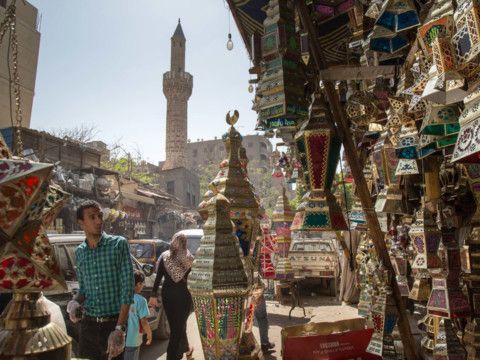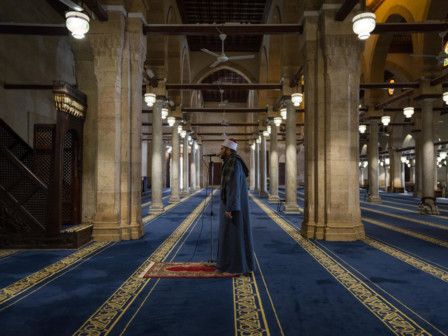
Cairo: For more than a thousand years, Cairo’s oldest mosques kept their doors open - through the Black Death of the 14th century, the devastating cholera epidemics of the 19th century and the Spanish flu in the winter of 1918 that claimed 140,000 Egyptian lives.
Then the coronavirus hit.
On the first day of the lockdown at Al Azhar, a famed centre of scholarship that opened in AD 972, tears flowed down the cheeks of the muezzin, Sheikh Mohamed Rashad Zaghloul, as he made the call to prayer in an empty hall.
“It was hard on my heart,” he said after midday prayers one day last week at the mosque, where a stray cat meandered between the ancient pillars. “When I call people, nobody can come. It feels like God is refusing us.”
The shuttered ancient mosques are a harbinger of another event that will be jarringly altered by the pandemic. Ramadan, the holy month of fasting, begins at the end of this week and promises this year to be the strangest experienced by any Cairene, not to mention 1.8 billion Muslims worldwide.
A sacred period that is rooted in gathering - at mosques, homes and on the streets - will be replaced with a month of solitary prayer, stifled celebrations and gnawing anxiety over the silent march of a virus that has closed a city that never, ordinarily, sleeps.
“It’s not going to be easy,” said Dr. Islam Hussein, an Egyptian virologist based in the United States who runs a YouTube channel that educates Egyptians about COVID-19. “People are attached to the rituals. It’s going to hurt.”
Locked down
Traditionally, Ramadan imposes a gentler rhythm on the usual hurly-burly of Cairo, a loud and boisterous megalopolis. At night, sidewalk cafes and high-end hotels teem with patrons who socialise into the wee hours. Then comes suhour, the predawn meal before another day of fasting.
This year, residents will be locked down at home under a nightly curfew that starts at 8 o’clock. Some wealthier Cairenes have fled to beach resorts. The great ancient sites, like the pyramids, are closed, and police officers roam scenic sites, like the bridges on the Nile, to discourage people from lingering.
“This Ramadan is going to be flavourless,” said Abdul Rehman, 19, at the deserted lantern store he tends in Khan Al Khalili, the city’s most famous bazaar.
First the tourists vanished, after the closing of the Cairo airport. Now Ramadan had been cancelled, at least commercially speaking.
“I just sit here and wait,” Rehman said glumly, as two women, veiled and wearing face masks, skirted past him down an empty alleyway.

At the nearby Zuwayla Gate, where criminals were once hanged, traders sold the giant colorful lanterns that are a mark of Ramadan in Cairo. Business had halved, several sellers reported. Like most of his customers, Ahmad Saeed, a shop owner, refused to wear a mask. “If God wants us to die, so it will be,” he said.
So far, the virus has taken a relatively modest toll on Egypt, with 3,333 confirmed cases and 250 reported deaths in a country of 100 million people. Turkey, which has 82 million inhabitants, has 91,000 cases. But the curve is accelerating, raising fears that the worst is yet to come.
Down the centuries, Egyptians tried to survive plagues by flocking to mosques rather than shunning them.
The magnificent Sultan Hassan mosque was built at the height of the Black Death in the 14th century. During later plagues, worshipers gathered to pray for deliverance said Amina Elbendary, a professor of Arab and Islamic civilisations at the American University in Cairo. Such prayers stopped only after the majority of congregants had died.
Still, the restrictions on worship today cut deep.
At the gates of Syeda Zainab, a glittering shrine in the east of the city, Mohsen Hussein offered his prayers at a police barricade, facing a shuttered door. “As long as I stand here, I feel close to the Syeda,” said Hussein, a carpenter, referring to the shrine’s saint. “It’s very painful to have a barrier with someone you love.”








